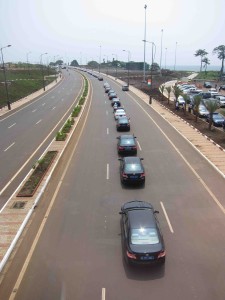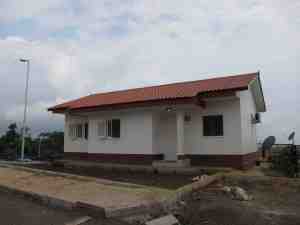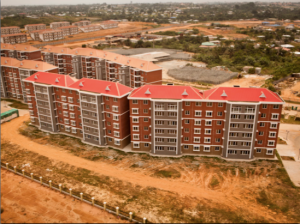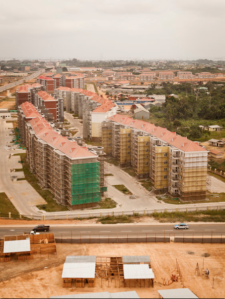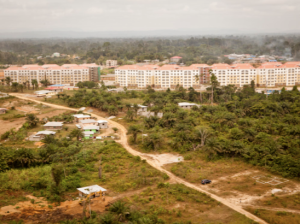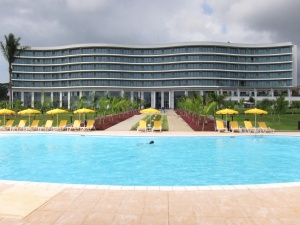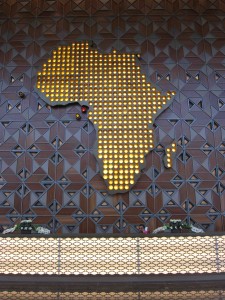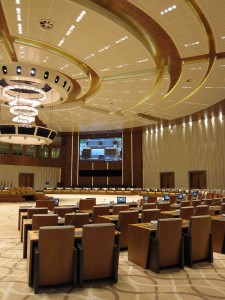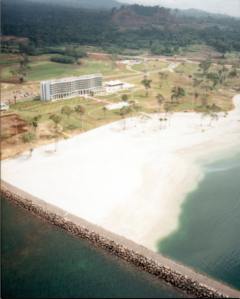It is interesting to note how the petro-dollars flowing into Equatorial Guinea are finding their way to every corner of this small country.
As well as a construction boom in Malabo and the country’s second city, Bata, there are some remarkable projects underway in smaller cities like Mongomo to the east of Equatorial Guinea’s continental landmass.
Much of the development in this charming little town is linked to the president, Teodro Obiang’s personal association with the place.
The long-standing president was born here and travels frequently to Mongomo for more relaxed meetings with prominent figures from home and abroad and to be close to his family and fellow Fang tribesmen.
It is a special place for the country, rich in flora and fauna and boasting important areas of jungle that are home to the country’s important gorilla population, animals that demand a special place in the country’s collective psyche.
A similar story to that of Bata and Malabo is unfolding in Mongomo’s construction industry with key government buildings being developed in a bid to de-centralise decision making away from the island of Bioko.
In this vein, the South Korean giant, SsangYong Engineering & Construction, the company handed the task of building the Marina Bay Sands Hotel Complex in Singapore one of the world’s most stunning buildings, has been handed a contract to build a complex in the city that has been dubbed the Mongomo Leader’s Club.
Since last year, South Korean politicians have been regular visitors to the country lobbying for important construction contracts as well as a participation in oil and gas fields and a second LNG train from the island of Bioko.
The country’s diplomatic efforts have resulted in an important breakthrough in the construction sector with the Mongomo Leader’s Club set to become the first building constructed in Equatorial Guinea by a South Korean company.
The company reported that it received a construction contract worth US$77 million to build the club, which will occupy an area of 7,530 sq m, comprising two units, a four-storey structure and another separate two-storey building.
Fitted out on a par with the very best five-star hotels, including a reception room for the president’s exclusive use, a VVIP theatre with a capacity for 150 people, a beauty salon, a restaurant, a conference hall, a fitness centre, and a small casino. No expense will be spared with a build cost of approximately $10,500 per sq m.
Not far from the luxury complex is the Basilica of the Immaculate Conception in Mongomo, the latest addition to Equatorial Guinea’s rapidly expanding collection of landmark buildings.
The expansive baroque religious temple with a capacity to hold up to 8,000 people and an area of 2,000 sq m was constructed by the Italian company, Moquinen Venture, over a period of five years at a cost of €13.5 million.
Equatorial Guinea’s official religion has been Roman Catholic since 1883 and significant investments have been made to restore many of the country’s churches in the last decade. These government-funded improvements to churches and progress in the country’s record on human rights have helped overcome historical difficulties between the government and the Catholic Church HQ in the Vatican.
Nigerian cardinal Francis Arinze, the president of the Pontificate Council for Inter-religious dialogue, represented Pope Benedicto XVI at the inauguration ceremony, which was also attended by five Cardinals, 45 Bishops, and some 300 priests from Central African region.
On the same day, the country’s minister of public works, Demetrio Elo Ndong Nsefumu – one of the busiest men in the country judging by appearances at the opening of new buildings almost every day – managed to combine work with pleasure when he tied the knot with María Jesusa Nchama Asumu.

